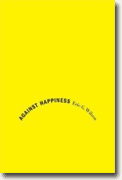Against Happiness
Eric G. Wilson
book reviews:
· general fiction
· chick lit/romance
· sci-fi/fantasy
· graphic novels
· nonfiction
· audio books
· author interviews
· children's books @
curledupkids.com
· DVD reviews @
curledupdvd.com
newsletter
win books
buy online
links
home
for authors
& publishers
for reviewers

 |
Against Happiness: In Praise of Melancholy Eric G. Wilson Farrar, Straus & Giroux Hardcover 176 pages January 2008 |
|
Against Happiness
Continuing, Wilson genuinely fears the complete eradication of melancholy as more Americans are placed on antidepressants in their search for what he considers to be a superficial bliss. If only it was that simple. Many people on antidepressants only find temporary relief from their symptoms and spend a lifetime alternating treatments to achieve a state of well-being. But Wilson does make an excellent point. He emphasizes the need for balance and contrast in living a full life. The old adage that we cannot truly appreciate happiness if we do not suffer is a valid statement. How do we even recognize happiness if we cannot contrast it with pain? The definition becomes blurred after a time. And if the view of the current state of affairs has been becoming a little too rosy, Wilson’s tirade on current world conditions will provide an ample dose of reality. His commentary on the historical ideal of the “pursuit of happiness” is also of interest. Few would argue that the purpose of American education is anything but to prepare students for capitalism, but Wilson seems to view capitalism as a type of soul relinquishment for material wealth. He believes that the desire for happiness is essentially a need for personal control, a self-serving endeavor. Then we move on to another shaky platform in Wilson’s assertion. He uses great literary and artistic figures of the past to illustrate how sadness and melancholy enabled them to create invaluable contributions to society. Unfortunately, his examples include icons such as Virginia Woolf, for whom depression and mental illness resulted in despair so great that it led to her ultimate demise. Such extreme examples do little to reassure the public that misery should be revered. On page seven, he emphasizes that he does not wish to romanticize clinical depression, but in using these situations as examples, that is exactly what he is doing. Thankfully, on page 104, he concedes that he probably is “being overly generous to these destructive types because of what they left behind.” With all of these disputes, it may appear that Against Happiness Originally published on Curled Up With A Good Book at www.curledup.com. © Sabrina Williams, 2008 |
|
|
|
 Click here to learn more about this month's sponsor! |
|
| fiction · sf/f · comic books · nonfiction · audio newsletter · free book contest · buy books online review index · links · · authors & publishers reviewers |
|
| site by ELBO Computing Resources, Inc. | |
 Wilson begins by describing happiness as a threat. Many surveys actually report that Americans are increasingly depressed and unhappy with their lives, but Wilson mentions a poll from the Pew Research Center that illustrated 85 percent of Americans consider themselves to be happy. As he rails against the publishing industry that currently pumps out happiness manuals with the result of millions of dollars in book sales, it seems his argument is weak. If the majority of Americans consider themselves to be happy, why would they be devouring happiness self-help books at such an incredible rate?
Wilson begins by describing happiness as a threat. Many surveys actually report that Americans are increasingly depressed and unhappy with their lives, but Wilson mentions a poll from the Pew Research Center that illustrated 85 percent of Americans consider themselves to be happy. As he rails against the publishing industry that currently pumps out happiness manuals with the result of millions of dollars in book sales, it seems his argument is weak. If the majority of Americans consider themselves to be happy, why would they be devouring happiness self-help books at such an incredible rate?